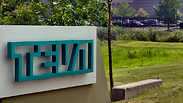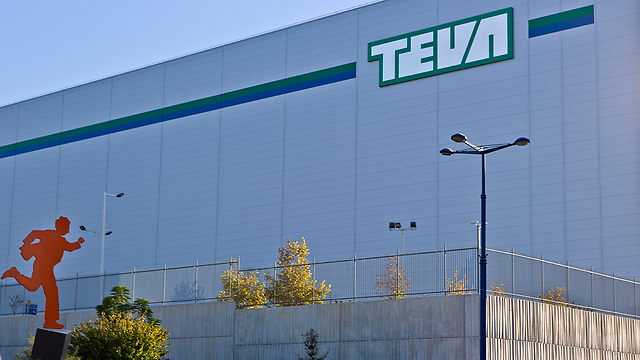
Teva expected to lay off about 25% of its Israeli employees
Not yet recovered from its major losses earlier this year, and on the heels of previous wave of massive redundancies, the Israeli pharmaceutical company is set to dismiss about 1,700 of its workers in Israel.
The Israeli pharmaceutical giant Teva is expected to lay off about 1,700 of its employees in Israel, who make up about 25% of all the company's employees in Israel, out of a total workforce of 6,680 employees.
Employees are expected to receive letters of summons for a hearing before dismissal in the coming weeks.
Teva is also expected to announce the dismissal of hundreds of its employees in the United States, and limited layoffs in Europe.
Dr. Michael Hayden, who joined Teva as President of Global R&D and Chief Scientific Officer in 2012, is also set to leave the company.
Teva's management, headed by CEO Kare Schultz, is currently working on the details of the move together with the managers of the company's regional divisions in Israel and the US.
Regardless of the previous wave of layoffs
The layoffs came in the wake of poor third-quarterly reports published by Teva three weeks ago, which showed a severe blow to profitability, a drop in cash flow and a dramatic reduction in the forecast for the rest of the year.Most of the company's financial distress stems from the loss of Copaxone patents, its flagship drug for the treatment of multiple sclerosis.
About two months ago, Teva's competitor, Mylan, received approval to market the generic version of Copaxone, which is expected to lead to a deep loss of revenues, especially in Teva's profit rates since the fourth quarter.
The move is in line with the image of Teva's new CEO, who already gained a reputation for being "hardcore" in his previous position as CEO of Lundbeck, when he fired nearly 17 percent of the company's workforce shortly after taking office.
The current wave of layoffs is unrelated to the wave announced by Teva in the second quarterly financial reports in August, as well as the layoffs of hundreds of workers that took place in July.
In July, the company announced its intention to sack 350 workers at the Teva Tech plant in Kfar Saba, which led to a wave of protests from Knesset members and the Histadrut. Eventually, the company agreed to slightly reduce the number of layoffs.
This time the move is planned for the company's offices only, and at this stage there is no involvement of the Histadrut in the process.
On August 5, with the publication of its second quarter reports, Teva announced that it would lay off 7,000 of its employees by the end of 2017, after its acquisition of Actavis Generics in August 2016 and heavy quarterly losses left it in severe debt.
In addition, Dr. Yitzhak Peterburg, who was the company's temporary general manager at the time, announced that Teva would close or sell six of its plants by the end of 2017 and another nine plants in 2018, adding it will shutter operations in 45 countries by the end of 2017.
Those layoffs were partly of employees in devisions the company sold, meaning that the current wave of layoffs is much more dramatic and in fact could bring the number of employees to nearly half of what it was a year ago.
A difficult blow to recover from
In October, Teva suffered a severe blow when the US Food and Drug Administration (FDA) authorized Mylan to market a generic version of Copaxone, Teva's original drug for the treatment of multiple sclerosis and the drug with the largest market share in the US for drugs treating the disease.
From June 2016 to June 2017, Copaxone's sales amounted to $3.3 billion in the US and $4.1 billion worldwide. It comprised about 18% of Teva's total sales.
It was clear at the time of the FDA's announcement that the approval of a generic version of Copaxone would make it difficult for the company to cope with the huge debt it had accumulated in the costly acquisition of Actavis Generics for $ 38.3 billion in cash and shares due to Copaxone's enormous contribution to the cash flow surplus Of Teva's ongoing activities.
Fear of takeover
At the beginning of November, with the publication of its third quarterly results, Teva's share plunged 20% to a value that is 83% lower than it was at its peak.
At the same time, the yield on its bonds jumped dramatically because, according to Teva's forecasts, there is a real concern that the company will soon fall into a liquidity crisis that will make it difficult to repay its debts on time, while the amount of assets at its disposal that it can put up for sale is shrinking.
Various investment funds have begun considering taking over the company.
The management's dramatic move was apparently intended to cope with such a possibility, and to significantly reduce salary expenses in order to try to handle the repayment of the company's large debt and stabilize its financial position.
This is in addition to possible measures such as raising $ 4-5 billion in equity, which will strengthen the company's equity of $ 29.6 billion at the end of the third quarter.
MK Itzik Shmuli (Zionist Union), a member of the Knesset Labor Committee said, "Teva is teaching Israeli society a lesson in greed. How can a company receive NIS 6 billion in tax breaks from the State and in exchange fire hundreds of its workers? A crisis of this scale requires cooperation and agreements with the employees and no unilateral and coercive actions."












